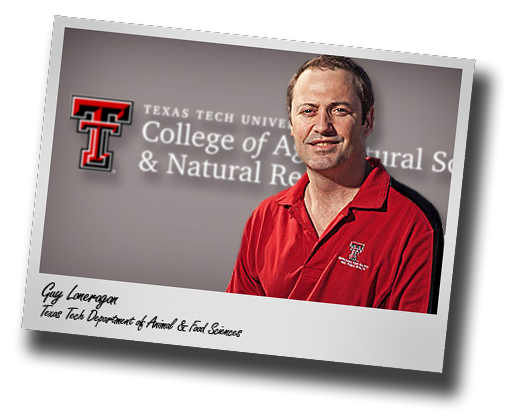In Profile: Guy Loneragan's Long Pursuit of Global Food Safety Improvement

Veterinary medicine has long been the focus of Guy Loneragan's life. From the time he was old enough to stand on a stool; Loneragan helped his veterinarian father work with cattle. There, he learned valuable skills and gained insight into the practice of veterinary medicine. But it took time and traveling thousands of miles before he finally found his passion.
Loneragan, a professor of epidemiology and animal health in Texas Tech's Department of Animal and Food Sciences, first realized that he wanted to pursue a career in veterinary medicine around his junior and senior year of high school in his native Mudgee, Australia.
"I don't know what took me so long to realize that, but I had always enjoyed working with cattle and working with my father and what he was doing," Loneragan said. "Then it sort of solidified or became more granulated that if I enjoy it so much, why don't I go to university to become a veterinarian?"
Not only was his father a vet in the late '70s, he pioneered embryo transplant in cattle in Australia. "Growing up, our family was always fairly entrepreneurial and would not, or did not, like settling for the norm, or the mundane, if you will," Loneragan said. "So the decision to leave Australia to pursue something new and different was embraced by my family."
Loneragan received his veterinary degree from the University of Sydney. With encouragement from his professors to continue his education, Loneragan contacted researchers at Colorado State University. Luckily, a position was available, so he packed his bags and headed to the United States. After coming Loneragan realized that he didn't enjoy individual animal medicine, and his interest turned to understanding how diseases spread or could be controlled in populations.
"It really intrigued me that cattle could harbor a hidden pathogen that could be quite deadly to humans but completely harmless to the cattle," Loneragan said, "and that got me really interested in food safety, public health from a population perspective and trying to understand how we can do things in livestock that have meaningfully beneficial impacts on humans.
Today, Loneragan's research focuses on understanding the ecology of antibody resistance, and looking at pathogens such as salmonella and E. coli O157 to understand their ecology within livestock populations. His experiences have fueled a passion for improving food safety. "If you look globally, we share a lot of problems," Loneragan said. "We all have common desires, we all want safe food."
Written By Meredith Holdsworth
CONTACT: Leslie Thompson, chairman and professor, Department of Animal and Food Sciences, Texas Tech University at 806-742-2805, ext 224 or leslie.thompson@ttu.edu
1204NM12/ PHOTO: Neal Hinkle
Editor's Note: For more information, go to http://www.depts.ttu.edu/vpr/discoveries/Fall-2012/loneragan.php
Davis College NewsCenter
-
Address
P.O. Box 42123, Lubbock, Texas 79409-2123, Dean's Office Location:Goddard Building, Room 108 -
Phone
(806)742-2808 -
Email
kris.allen@ttu.edu
